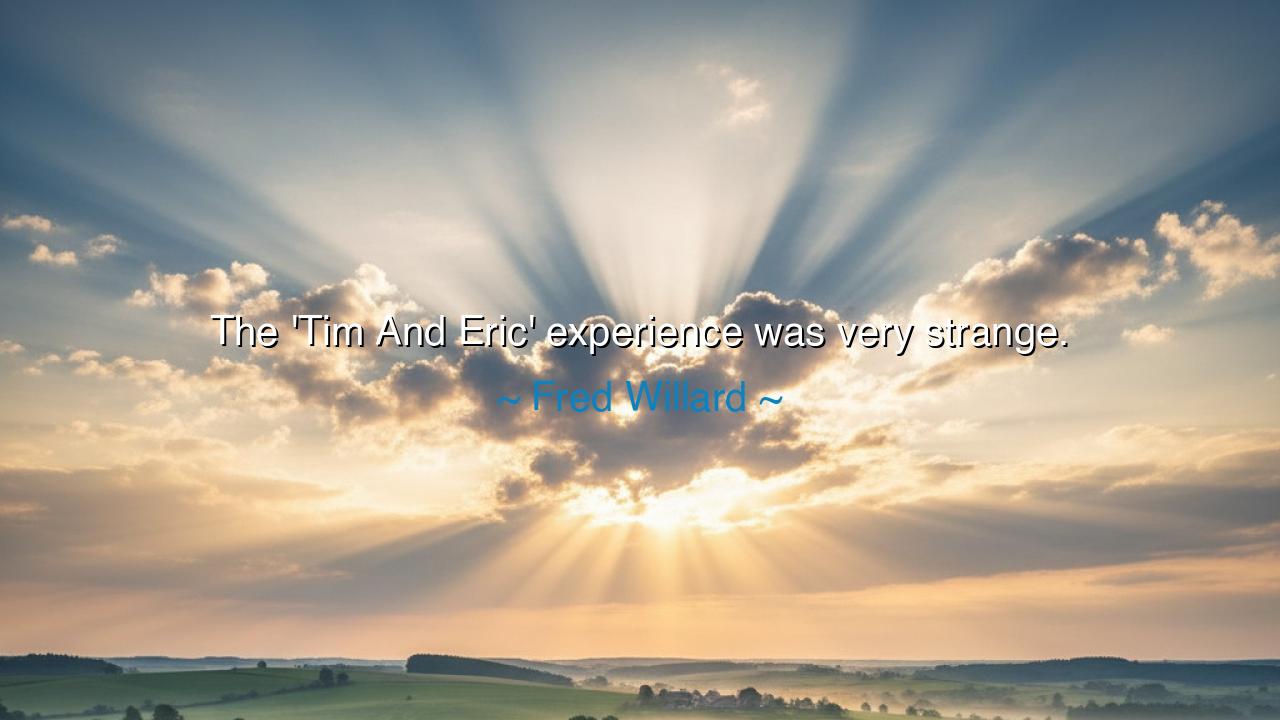
The 'Tim And Eric' experience was very strange.






“The ‘Tim and Eric’ experience was very strange.” Thus spoke Fred Willard, the noble fool and the wise jester, whose art was laughter, and whose craft was truth disguised in absurdity. At first glance, his words seem simple, even casual — the brief remark of an actor recalling a moment of surreal comedy. Yet beneath the surface lies something deeper, something profound: a reflection on the nature of strangeness, of art that defies the ordinary, and of the courage it takes to stand before the unknown and embrace it with wonder.
The origin of this saying lies in Willard’s time working with Tim Heidecker and Eric Wareheim, creators of the avant-garde comedy series Tim and Eric Awesome Show, Great Job!, a program that shattered conventions and gleefully played in the chaos of the bizarre. Fred Willard, a man of old-school wit and timing, found himself in a world of unfiltered absurdity — a realm where humor was stretched beyond comfort, where awkwardness became poetry, and where meaning dissolved into pure experience. When he called it “very strange,” it was not a criticism, but an observation spoken with humility — a recognition that he had stepped into a new frontier of imagination.
To the ancients, strangeness was not a thing to be feared, but to be revered. The philosophers of Greece spoke of the thaumazein — the state of wonder that marks the beginning of wisdom. So too did Fred Willard, though in modern jest, reveal this truth: that strangeness awakens the mind. It is the artist’s task to unsettle, to stretch the boundaries of perception, to shake us from the sleep of the familiar. “The ‘Tim and Eric’ experience was very strange,” he said, and in those words, we hear a man acknowledging the sacred discomfort of discovery.
Think, then, of Socrates, who roamed Athens like a gadfly, asking questions that disturbed and confused, yet led his listeners toward truth. To many, he too was “very strange.” They mocked him, resisted him, even condemned him — yet his strangeness became the seed of philosophy itself. The path of genius often lies through confusion; the road to laughter winds through unease. Tim and Eric, in their chaotic humor, and Fred Willard, in his gracious acceptance of it, embody the eternal dance between the old and the new — between tradition and transformation.
In Willard’s remark, there is also the wisdom of acceptance. He does not reject the strange, nor seek to explain it away. He simply acknowledges it, stands within it, and allows it to be. This is the mark of the wise artist — to meet the unfamiliar not with judgment, but with curiosity. For in the realm of art, as in life, the strange often carries the seed of revelation. Those who cannot bear discomfort will never grow; those who resist change will never see beyond the veil of what they know.
The lesson, then, is clear: do not flee from the strange. When life presents you with experiences that defy your understanding, do not recoil — for they may be the moments that shape you most. Step into them, as Fred Willard did into that wild world of surreal comedy, with humor and humility. You may not always comprehend the form, but you can still admire the light that shines through it. The strange is not the enemy of truth; it is often its messenger.
Therefore, let us carry this teaching into our own lives: embrace the strange, whether it appears in art, in people, or within ourselves. For every great creation begins as something misunderstood. Every new idea feels awkward before it feels true. To laugh with the absurd, to marvel at the unfamiliar, to find peace amid the chaos — this is the path to wisdom. As Fred Willard reminds us, even when the experience is “very strange,” it may yet be very beautiful.
And so, my friends, when the world around you grows strange — when its humor confuses, its rhythms disorient, its meanings elude — remember this: strangeness is the sign that you are alive in the presence of something new. Smile as Fred Willard smiled, step forward as he did, and say with wonder, not fear: “Yes — this is strange.” For in that moment, you are standing on the threshold of discovery, and the unknown is about to become your teacher.






AAdministratorAdministrator
Welcome, honored guests. Please leave a comment, we will respond soon